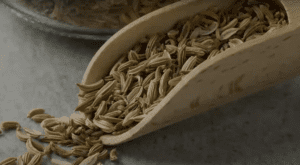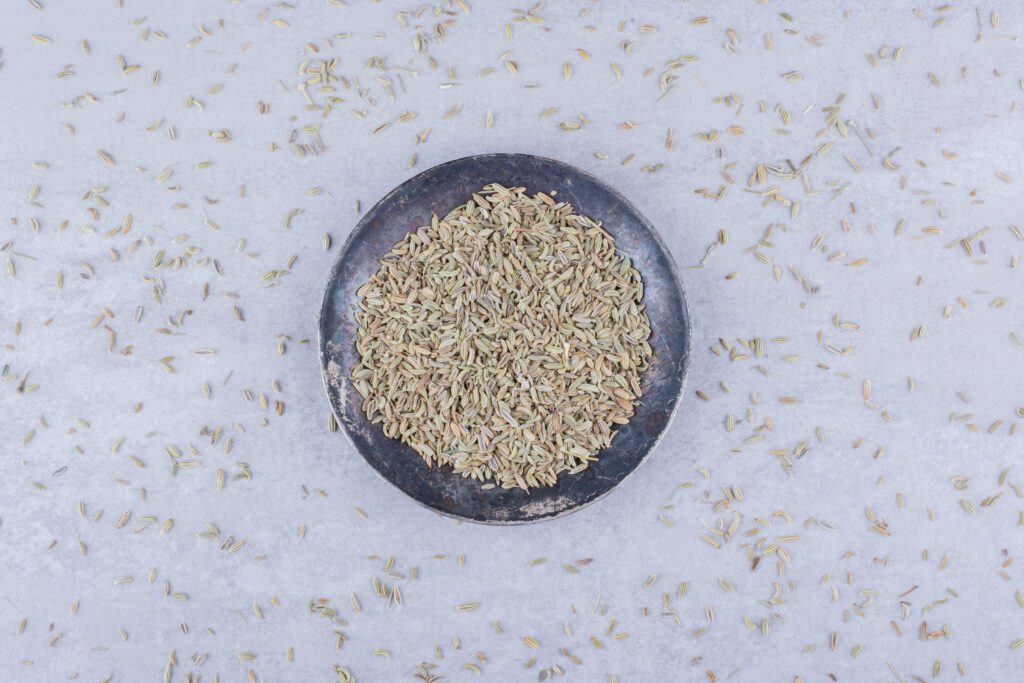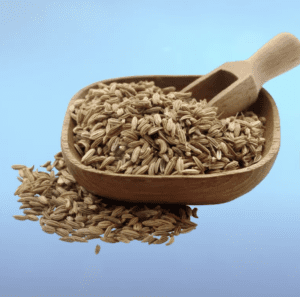What Are Fennel Seeds?
Fennel seeds are the dried seeds of the fennel plant, which is a flowering herb belonging to the carrot family (Apiaceae). These seeds have a distinct anise or licorice-like flavor and aroma. They are commonly used as a spice in cooking, particularly in Mediterranean, Indian, and Middle Eastern cuisines.
Fennel seeds are often used whole or ground to add flavor to dishes such as soups, stews, curries, bread, and pickles. They can also be chewed after a meal as a breath freshener and digestive aid due to their carminative properties, which help to alleviate bloating and gas.
Indians are food lovers and for post-food refreshment, their love for fennel seeds (Saunf) is not unknown. Indians have long recognized the fennel benefits, particularly as a post-meal digestive aid. However, these tiny seeds are not just for refreshment purposes but also essential for their indispensable medicinal and culinary practices. That’s why India is one of the largest exporters of fennel seeds.
What’s a Good Substitute for Fennel Seeds?
If you need a swap for fennel seed, you can use anise seed since their tastes are similar. But remember, you will want to use less anise, as it tends to be more pungent. Depending on your preferences, other seeds will work as well, such as dill, caraway, cumin or coriander.
Nutrition
In addition to their other health benefits, fennel seeds are rich in:

- vitamin c
- Calcium
- Iron
- Magnesium
- Potassium
Health Benefits of Fennel Seeds
Fennel seeds offer several potential health benefits, supported by traditional use and some scientific research. Here are 8 health benefits associated with fennel seeds:
- Relief from Menstrual Symptoms

Some studies suggest that fennel seeds may help alleviate menstrual cramps and other symptoms associated with menstruation, such as bloating and mood swings.
- Antioxidant Properties
Fennel seeds contain antioxidants such as flavonoids and phenolic compounds, which may help protect cells from damage caused by free radicals and reduce the risk of chronic diseases.
- Anti-inflammatory Effects
Certain mixtures in fennel seeds have been found to have mitigating properties, which might assist with diminishing irritation in the body and lighten side effects of provocative circumstances.
- Improved Heart Health
Exploration recommends that consuming fennel seeds might assist with bringing down circulatory strain and cholesterol levels, consequently decreasing the gamble of coronary illness.
- Regulation of Blood Sugar Levels
A few investigations show that fennel seeds might assist with directing glucose levels, making them possibly gainful for people with diabetes or those in danger of creating diabetes.
- Improvement of Skin Health
Fennel seeds contain supplements and cell reinforcements that might advance solid skin and assist with forestalling skin conditions like skin inflammation and maturing.
- Weight Management
Some research suggests that fennel seeds may aid in weight management by promoting satiety, reducing appetite, and enhancing metabolism.
- Digestive Health
Traditionally, fennel has been used as a carminative agent. It may help remove the accumulated gas from the stomach, relieving bloating. Fennel water may also manage flatulence (gas) in infants. Fennel seeds may promote the release of digestive secretions necessary for good digestion and absorption of food. Fennel extract might be used for its protective activity against stomach damage. However, you need to reach out to your healthcare provider if you experience stomach problems.
How to Use Fennel Seeds
Fennel seeds can be used in various ways to add flavor and depth to dishes. Here’s how you can use fennel seeds in your cooking:
- Whole Fennel Seeds:
Add whole fennel seeds to marinades for meats, poultry, or fish to impart a subtle anise flavor.
Toast whole fennel seeds in a dry pan until fragrant, then grind them to use as a spice in curries, soups, or stews.
Include whole fennel seeds in pickling brines for vegetables like cucumbers or carrots.
- Ground Fennel Seeds:
Grind fennel seeds to a fine powder and use as a seasoning for roasted vegetables, such as carrots, potatoes, or squash.
Mix ground fennel seeds with other spices like cumin, coriander, and turmeric for a homemade curry powder blend.
Use ground fennel seeds in baking recipes, such as bread, cookies, or cakes, for a hint of sweetness and aroma.
- Fennel Seed Tea:
Steep crushed fennel seeds in hot water to make a soothing herbal tea. You can add honey or lemon for extra flavor.
Combine fennel seeds with other herbs like peppermint or chamomile for a digestive herbal tea blend.
- Fennel Seed Infused Oil:
Infuse olive oil with fennel seeds by heating the oil and adding whole fennel seeds. Let it cool and strain out the seeds. Use the infused oil in salad dressings or for drizzling over grilled vegetables or pasta dishes.
- Fennel Seed Seasoning:
Create a fennel seed seasoning blend by combining ground fennel seeds with salt, pepper, garlic powder, and dried herbs like thyme or rosemary. Use this seasoning mix to flavor roasted meats, vegetables, or potatoes.
- Fennel Seed Garnish:
Sprinkle whole or crushed fennel seeds as a garnish over dishes like soups, salads, or roasted vegetables to add a pop of flavor and texture.
Use fennel seeds as a topping for homemade breadsticks, crackers, or savory biscuits before baking for extra flavor.
Conclusion
Fennel seeds, with their aromatic and flavorful profile, have left an indelible mark on culinary traditions, medicinal practices, and cultural beliefs throughout history. From ancient civilizations to modern kitchens, these tiny seeds have been valued for their unique taste, health benefits, and symbolic significance.
In the culinary world, fennel seeds add a distinct licorice-like flavor and subtle sweetness to dishes, ranging from savory curries and roasts to baked goods and teas. Their versatility extends beyond seasoning; they are also used in traditional liqueurs like absinthe and as an ingredient in spice blends such as Chinese five-spice powder.
Frequently Asked Questions About Fennel Seeds

-
Do fennel seeds assist with weight reduction?
While fennel seeds might help absorption and decrease swelling, there is restricted logical proof to help their immediate job in weight reduction. They can be a solid expansion to a reasonable eating routine yet ought not be depended upon as a sole weight reduction arrangement.
-
Where can I buy high-quality fennel seeds?
Excellent fennel seeds can be bought from specialty zest shops, wellbeing food stores, online retailers, and natural business sectors. Search for natural, entire fennel seeds for the best flavor and quality.
-
What are the health benefits of fennel seeds?
Fennel seeds are rich in antioxidants and fiber, promoting digestive health, reducing bloating, and potentially easing menstrual discomfort. They also contain nutrients like potassium, calcium, and magnesium.
-
How do you use fennel seeds in cooking?
Fennel seeds are commonly used whole or ground to add a warm, slightly sweet flavor to dishes. They are used in curries, soups, stews, marinades, pickles, and baked goods like bread and cookies.
-
Are fennel seeds and anise seeds the same thing?
While they have a similar flavor, fennel seeds and anise seeds come from different plants. Fennel seeds are from the fennel plant (Foeniculum vulgare), while anise seeds are from the anise plant (Pimpinella anisum).
-
Can fennel seeds help with digestion?
Yes, fennel seeds are known for their carminative properties, which can help alleviate bloating, gas, and indigestion. They stimulate digestion and may soothe gastrointestinal discomfort.
Recommended blog : https://yogayurvedaa.com/cinnamon-top-7-amazing-health-benefits/

